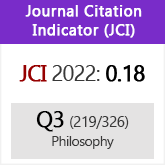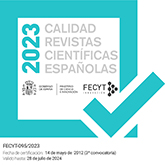Realismo político, modus vivendi y democracia agonística
DOI:
https://doi.org/10.3989/isegoria.2023.69.07Palabras clave:
Realismo político, modus vivendi, democracia agonista, legitimidad, políticaResumen
El realismo político señala que la política consiste en la creación y sostenimiento del orden en un contexto de persistente desacuerdo, proclive a conflictos y donde el uso de la coerción por parte del poder político es inevitable. Los realistas sostienen que el modus vivendi es un arreglo político contingente al nivel de la constitución política que permite a diversos grupos de personas coexistir pacíficamente. Las propuestas del modus vivendi no dicen mucho sobre cómo tratar con los desacuerdos y conflictos. En este artículo se argumenta que las propuestas de la democracia agonista solventan esta carencia. Aquí se argumenta que las propuestas de la democracia agonista comparten premisas con el realismo político y contribuyen al sostenimiento de un modus vivendi liberal.
Descargas
Citas
Colomer, J. M. (1998) "The Spanish "State of Autonomies": Non-Institutional Federalism". West European Politics 21 (4): 40-52. https://doi.org/10.1080/01402389808425270
Connolly, W. (1991) IdentityDifference. Democratic Negotiations of Political Paradox. Minneapolis: University of Minnesota Press.
Connolly, W. (1999) Why I Am Not Secularist. Minneapolis: University of Minnesota Press.
Connolly, W. (2005) Pluralism. Durham: Duke University Press.
Dauenhauer, B. P. (2000) "A Good Word for Modus Vivendi", in Davion V. & Wolf, C. (eds.), The Idea of Political Liberalism. Essays on Rawls, 204-220. Lanham: Rowman & Littlefield Publishers, Inc.
Field, B. N. (2014) "From Consensual to Complex Multi-level Democracy. The Contours of Contestation and Collaboration in Spain". Comillas Journal of International Relations 1: 41-52.
Finlayson, L. (2017) "With radicals like these, who needs conservatives? Doom, gloom, and realism in political theory". European Journal of Political Theory 16: 264-282. https://doi.org/10.1177/1474885114568815
Fumagalli, C. (2022) "Modus Vivendi Arrangements, Stability, and the All-Subjected Principle". Rivista Italiana Di Filosofia Politica (2): 191-210. https://doi.org/10.36253/rifp-1691
Galston, W. A. (2010) "Realism in political theory". European Journal of Political Theory 9 (4): 385-411. https://doi.org/10.1177/1474885110374001
García-Agustín, Ó. & Raftopoulos, M. (2021) "The Catalan Way to Independence and the Spanish- Catalan Conflict", in Agustín, Ó. G. (ed,), Catalan Independence and the Crisis of Sovereignty, 3-26. Palgrave Macmillan, Cham. https://doi.org/10.1007/978-3-030-54867-4_1
Gillespie, R. (2015) "Between Accommodation and Contestation: The Political Evolution of Basque and Catalan Nationalism", in Gillespie R. & Gray C. (eds.), Contesting Spain? The dynamics of nationalist movements in Catalonia and the Basque Country, 1-21. Abingdon: Routledge. https://doi.org/10.1080/13537113.2015.1003484
Guess, R. (2008) Philosophy and Real Politics. Princeton: Princeton University Press.
Gray, C. (2020) Territorial Politics and the Party System in Spain. Abingdon: Routledge. https://doi.org/10.4324/9780429290060
Gray, J. (2000) Two Faces of Liberalism. New York: The New Press.
Gray, J. (2007) "Reply to Critics", in Horton J. & Newey G. (eds.), The Political Theory of John Gray, 211- 235. Abingdon: Routledge.
Hall, E. (2020) Value, Conflict, and Order. Berlin, Hampshire, Williams, and the Realist Revival in Political Theory. Chicago: The University of Chicago Press. https://doi.org/10.7208/chicago/9780226718453.001.0001
Horton, J. (2007) "John Gray and the Political Theory of Modus Vivendi", in Horton, J. & Newey, G. (eds.), The Political Theory of John Gray, 43-58. Abingdon: Routledge.
Horton, J. (2010) "Realism, liberal moralism and a political theory of modus vivendi". European Journal of Political Theory 9 (4): 431-448. https://doi.org/10.1177/1474885110374004
Horton, J. (2011) "Modus Vivendi and Religious Conflict", in Mookherjee, M. (ed.), Democracy, Religious Pluralism and the Liberal Dilemma of Accommodation, 121-136. Dordrecht: Springer. https://doi.org/10.1007/978-90-481-9017-1_7
Horton, J. (2018) "Political legitimacy and modus vivendi". Biblioteca della libertà (222): 1-18. https://doi.org/10.1007/978-3-319-79078-7_1 PMCid:PMC6863618
Horton, J. (2019) "Modus Vivendi and Political Legitimacy", in Horton J., Westphal M., & Willems U., The Political Theory of Modus Vivendi, 131-148. Cham: Spring Nature. https://doi.org/10.1007/978-3-319-79078-7_8 PMCid:PMC7485376
Jones, P. (2017) "The Political Theory of Modus Vivendi". Philosophia 45: 443-461. https://doi.org/10.1007/s11406-016-9800-1 PMid:30147163 PMCid:PMC6086235
Jubb, R., & Rossi, E. (2015) "Political Norms and Moral Values". Journal of Philosophical Research 40: 455-458. https://doi.org/10.5840/jpr201511539
Luque, P. (2020) "Política y autoridad en Bernard Williams". Decisiones 24 (1): 179-209. https://doi.org/10.52292/j.dsc.2020.2209
McCabe, D. (2010) Modus Vivendi Liberalism. Theory and Practice. Cambridge: Cambridge University Press. https://doi.org/10.1017/CBO9780511750359
McQueen, A. (2017) "Political realism and the realist 'Tradition'". Critical Review of International Social and Political Philosophy 20 (3): 296-313. https://doi.org/10.1080/13698230.2017.1293914
Mills, C. (2000) ""Not a mere Modus Vivendi": The Bases for Allegiance to the Just State", in Davion, V. & Wolf, C. (eds.), The Idea of Political Liberalism. Essays on Rawls, 190-203. Lanham: Rowman & Littlefield Publishers, Inc.
Mouffe, C. (1993) The Return of the Political. London: Verso.
Mouffe, C. (2000) The Democratic Paradox. London: Verso.
Muro, D. (2015) When do countries re-centralize?: Ideology and party politics in the age of austerity, in Gillespie, R. & Gray, C. (eds.), Contesting Spain? The dynamics of nationalist movements in Catalonia and the Basque Country, 22-40. Abingdon: Routledge.
Muro-Cabral, C. (2023) "Modus Vivendi y Democracia Agonista: Concepciones Realistas de Estabilidad Política y Democracia". Revista SAAP 17 (1): 117-126. https://doi.org/10.46468/rsaap.17.1.n2
Paxton, M. (2015) "Inclusiveness, Adversarialism and Perfectionism: Exploring the Three Approaches to Agonistic Democracy", in Paxton, M., Kolpinskaya, E. & Jonasova, J. (eds.), Politics in Crisis?, 122-132. Newcastle: Cambridge Scholars Publishing.
Paxton, M. (2020) Agonistic Democracy Rethinking Political Institutions in Pluralist Times. Abingdon: Routledge. https://doi.org/10.4324/9780429425066
Ragone, S., & González, G. M. (2021) "The Catalan Issue from a Comparative Constitutional Perspective", in Agustín, Ó. G. (ed.) Catalan Independence and the Crisis of Sovereignty, 223-238. Palgrave Macmillan: Cham. https://doi.org/10.1007/978-3-030-54867-4_10
Rawls, J. (2005) Political Liberalism (expanded ed.). New York: Columbia University Press.
Rodríguez-Fontenla, E. R. (2021) "Pluralismo de valores, liberalismo y modus vivendi en la teoría política de John Gray". Revista Española De Ciencia Política, (57), 167-190. https://doi.org/10.21308/recp.57.06
Rossi, E. (2019a) "Being realistic and demanding the impossible". Constellations 26: 638-652. https://doi.org/10.1111/1467-8675.12446
Rossi, E. (2019b) Can Modus Vivendi Save Liberalism from Moralism?, in Horton J., Westphal, M. & Willems U. (eds.), The Political Theory of Modus Vivendi, 95-109. Cham: Spring Nature. https://doi.org/10.1007/978-3-319-79078-7_6 PMCid:PMC6541518
Rossi, E., & Sleat, M. (2014) "Realism in Normative Political Theory". Philosophy Compass 9: 689-701. https://doi.org/10.1111/phc3.12148
Sabl, A., & Sagar, R. (2017) "Introduction". Critical Review of International Social and Political Philosophy 20 (3): 269-277. https://doi.org/10.1080/13698230.2017.1293335
Sleat, M. (2014a) "Legitimacy in Realist Thought: Between Moralism and Realpolitik". Political Theory 42 (3): 314-337. https://doi.org/10.1177/0090591714522250
Sleat, M. (2014b) "Realism, Liberalism and Non-ideal Theory Or, Are there Two Ways to do Realistic Political Theory?". Political Studies 64 (1): 27-41. https://doi.org/10.1111/1467-9248.12152
Sleat, M. (2018) "Introduction: Politics Recovered-on the Revival of Realism in Contemporary Political Theory", in Sleat, M. (ed.), Politics Recovered. Realist Thought in Theory and Practice, 1-25. New York: Columbia University Press. https://doi.org/10.7312/slea17528-002
Sleat, M. (2022) "Realism and Political Normativity". Ethic Theory Moral Practice 25: 465-478. https://doi.org/10.1007/s10677-021-10239-8
Tully, J. (1995). Strange multiplicity: constitutionalism in an age of diversity. Cambridge: Cambridge University Press. https://doi.org/10.1017/CBO9781139170888
Tully, J. (2002) "Struggles over Recognition and Distribution". Constellations 7 (4): 469-482. https://doi.org/10.1111/1467-8675.00203
Tully, J. (2004) "Recognition and dialogue: the emergence of a new field". Critical Review of International Social and Political Philosophy 7 (3): 84-106. https://doi.org/10.1080/1369823042000269401
Tully, J. (2008) Public philosophy in a new key. Volume one: Democracy and Civic Freedom. Cambridge: Cambridge University Press.
Ubasart-González, G. (2021) "The Independence Procés in Catalonia: The Triple Spanish Crisis and an Unresolved Question of Sovereignty", in Agustín, Ó. G. (ed,), Catalan Independence and the Crisis of Sovereignty, 33-55. Palgrave Macmillan, Cham. https://doi.org/10.1007/978-3-030-54867-4_2
Wendt, F. (2019) "Why Theorize Modus Vivendi?", in Horton, J., Westphal, M. & Willems, U. (eds.), The Political Theory of Modus Vivendi, 31-48. Cham: Spring Nature. https://doi.org/10.1007/978-3-319-79078-7_2
Wenman, M. (2003) "'Agonistic Pluralism' and Three Archetypal Forms of Politics". Contemporary Political Theory 2: 165-186. https://doi.org/10.1057/palgrave.cpt.9300091
Wenman, M. (2013) Agonistic Democracy Constituent Power in the Era of Globalisation. Cambridge: Cambridge University Press. https://doi.org/10.1017/CBO9780511777158
Westphal, M. (2018) "Compromise as a Normative Ideal for Pluralistic Politics", in Rostbøll, C. & Scavenius, T. (eds.), Compromise and Disagreement in Contemporary Political Theory, 79-94. New York: Routledge. https://doi.org/10.4324/9781315317823-6
Westphal, M. (2019a) "Overcoming the Institutional Deficit of Agonistic Democracy". Res Publica, 25, 187-210. https://doi.org/10.1007/s11158-018-9397-2
Westphal, M. (2019b) "Theorising Modus Vivendi", in Horton, J., Westphal, M. & Willems, U. (eds.), The Political Theory of Modus Vivendi, 1-27. Cham: Spring Nature. https://doi.org/10.1007/978-3-319-79078-7_1 PMCid:PMC6863618
Westphal, M. (2019c) "What Bonds Citizens in a Pluralistic Democracy? Probing Mouffe's Notion of a Conflictual Consensus", in Knowll, M., Snyder, S. & Şimsek, N (eds.), New Perspectives on Distributive Justice: Deep Disagreements, Pluralism, and the Problem of Consensus, 259-274. Boston: De Gruyter. https://doi.org/10.1515/9783110537369-017
Westphal, M. (2022) "For an Agonistic Element in Realist Legitimacy". Social Theory and Practice 48 (1): 165-191. https://doi.org/10.5840/soctheorpract20211217150
Williams, B. (2005) In the Beginning Was the Deed. Realism and Moralism in Political Argument. Princeton: Princeton University Press.
Williams, B. (2006) Ethics and the Limits of Philosophy. Abingdon: Routledge. https://doi.org/10.4324/9780203969847
Publicado
Cómo citar
Número
Sección
Licencia
Derechos de autor 2023 Consejo Superior de Investigaciones Científicas (CSIC)

Esta obra está bajo una licencia internacional Creative Commons Atribución 4.0.
© CSIC. Los originales publicados en las ediciones impresa y electrónica de esta Revista son propiedad del Consejo Superior de Investigaciones Científicas, siendo necesario citar la procedencia en cualquier reproducción parcial o total.Salvo indicación contraria, todos los contenidos de la edición electrónica se distribuyen bajo una licencia de uso y distribución “Creative Commons Reconocimiento 4.0 Internacional ” (CC BY 4.0). Puede consultar desde aquí la versión informativa y el texto legal de la licencia. Esta circunstancia ha de hacerse constar expresamente de esta forma cuando sea necesario.
No se autoriza el depósito en repositorios, páginas web personales o similares de cualquier otra versión distinta a la publicada por el editor.
Datos de los fondos
Universidad de Guadalajara
Números de la subvención Beca Institucional UDEG de Talento Global. Exp. 0210.Dictamen Núm. V/2022/347














